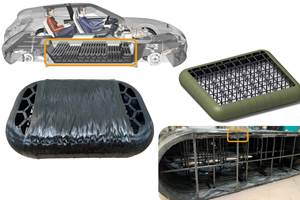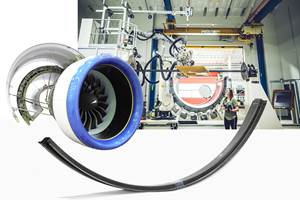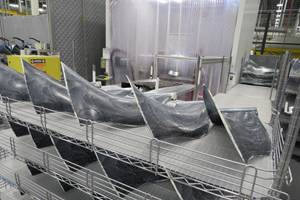OCSiA1 wins Frost & Sullivan's North American Award for Technology Innovation
The company's TUBALL single-wall carbon nanotubes can be produced at a commercial scale at very low cost, and are poised to improve the properties of many materials.
Based on its recent analysis of the carbon nanotubes market, Frost & Sullivan (San Antonio, TX, US) recognizes OCSiAl Group (Luxembourg) with the 2014 North American Award for Technology Innovation for its trademarked OCSiAl TUBALL products. The high purity and large-scale production of the OCSiAl TUBALL nano products are potential game-changers, says Frost & Sullivan, as commercialization of single-walled carbon nanotubes (SWNTs) has previously been a challenge.
Carbon nanotubes have the ability to change the characteristics of known materials — including structural strength, permeability, electrical conductivity, and thermal transport — and even allow for the creation of totally new products. SWNTs, in particular, have strong potential in advanced technologies, including high-performance composites, molecular electronics, and ultra-sensitive sensor devices. However, until now the uptake of SWNTs was slow due to high costs and greater processing difficulty when compared with multi-walled carbon nanotube production.
“OCSiAl has developed an industrial process to synthesize SWNTs that can be scaled up to eventually produce hundreds of thousands of tons of these nanoparticles, thereby potentially reducing production costs up to 100 times,” says Frost & Sullivan senior consultant Mike Valenti. “This ability to produce SWNTs in commercial scale quantities will initially drive the use of these nanoparticles in research, and then in high-end industrial and consumer applications.”
OCSiAl has designed its TUBALL product to contain a minimum of 75 percent SWNTs and less than 15 percent of non-carbon impurities, with the predominant non-carbon element being iron. Virtually all non-carbon species are encapsulated, providing highly crystalline nanotubes at a price close to one-fiftieth of that of comparable materials. These characteristics enable OCSiAl's SWNTs to be used as a universal additive, simultaneously enhancing the strength and electric and thermal conductivity of polymer composites, rubbers, metals, and other materials upon the addition of as little as 0.001 to 0.1 percent by weight of TUBALL. OCSiAl technology can serve multiple products and applications.
“Since OCSiAl's synthesis process completely encapsulates the impurities of catalyst particles in its SWNTs, it addresses a common problem in production, namely the presence of catalyst particles that are considered impurities,” noted Valenti. “Furthermore, OCSiAl scientists plan to limit the content of the free metal particles in TUBALL SWNTs to 1 percent. This is significant because making SWNTs with greater purity is a major goal of nanotechnology developers.”
The potential of OCSiAl’s innovation has also helped the company grow rapidly. Recently the company has launched its online store for nanotubes to make access to small quantities of nanotubes for R&D and trial usage as easy as never before. For large quantities of nanotubes OCSiAl has launched a partnership program to create a network of OCSiAl dealers worldwide. This program will also stimulate the production of TUBALL-enhanced versions of current products as well as the production of TUBALL-based industrial modifiers for various materials.
Each year, Frost & Sullivan presents this award to the company that has demonstrated uniqueness in developing and leveraging new technologies, which significantly impacts both the functionality and the customer value of the new products and applications. The award lauds the high R&D spend toward innovation, its relevance to the industry and the positive impact on brand perception.
OCSiAl is an international technology company with operations worldwide. Named after the four major elements Oxygen (O), Carbon (C), Silicon, (Si), and Aluminum (Al), the OCSiAl offices are located in the US, Europe (UK, Luxembourg, Germany, Russia), and Asia (South Korea). OCSiAl’s team consists of 160 people, including 22 scientists and 17 managers. In 2014 OCSiAl developed a breakthrough technology for the industrial production of single-walled carbon nanotubes (SWCNT) and entered the nanomaterials market with its universal additive TUBALL.
Related Content
Recycling end-of-life composite parts: New methods, markets
From infrastructure solutions to consumer products, Polish recycler Anmet and Netherlands-based researchers are developing new methods for repurposing wind turbine blades and other composite parts.
Read MoreTU Munich develops cuboidal conformable tanks using carbon fiber composites for increased hydrogen storage
Flat tank enabling standard platform for BEV and FCEV uses thermoplastic and thermoset composites, overwrapped skeleton design in pursuit of 25% more H2 storage.
Read MoreThe potential for thermoplastic composite nacelles
Collins Aerospace draws on global team, decades of experience to demonstrate large, curved AFP and welded structures for the next generation of aircraft.
Read MorePlant tour: Albany Engineered Composites, Rochester, N.H., U.S.
Efficient, high-quality, well-controlled composites manufacturing at volume is the mantra for this 3D weaving specialist.
Read MoreRead Next
Developing bonded composite repair for ships, offshore units
Bureau Veritas and industry partners issue guidelines and pave the way for certification via StrengthBond Offshore project.
Read MorePlant tour: Daher Shap’in TechCenter and composites production plant, Saint-Aignan-de-Grandlieu, France
Co-located R&D and production advance OOA thermosets, thermoplastics, welding, recycling and digital technologies for faster processing and certification of lighter, more sustainable composites.
Read MoreVIDEO: High-volume processing for fiberglass components
Cannon Ergos, a company specializing in high-ton presses and equipment for composites fabrication and plastics processing, displayed automotive and industrial components at CAMX 2024.
Read More















.jpg;maxWidth=300;quality=90)








